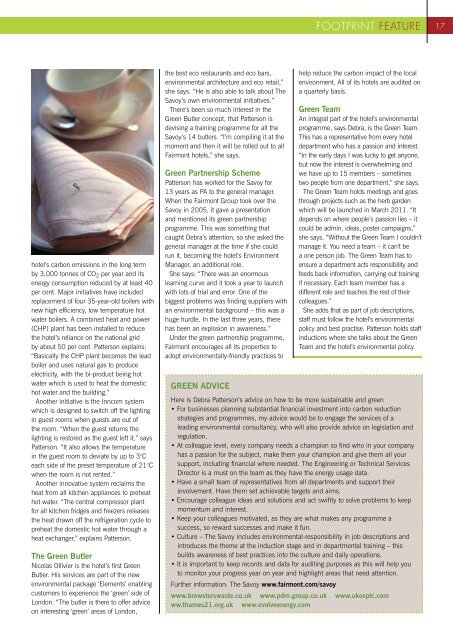Download Foodservice Footprint Issue 9 - January 2011
Download Foodservice Footprint Issue 9 - January 2011
Download Foodservice Footprint Issue 9 - January 2011
Create successful ePaper yourself
Turn your PDF publications into a flip-book with our unique Google optimized e-Paper software.
hotel’s carbon emissions in the long term<br />
by 3,000 tonnes of CO 2 per year and its<br />
energy consumption reduced by at least 40<br />
per cent. Major initiatives have included<br />
replacement of four 35-year-old boilers with<br />
new high efficiency, low temperature hot<br />
water boilers. A combined heat and power<br />
(CHP) plant has been installed to reduce<br />
the hotel’s reliance on the national grid<br />
by about 50 per cent. Patterson explains:<br />
“Basically the CHP plant becomes the lead<br />
boiler and uses natural gas to produce<br />
electricity, with the bi-product being hot<br />
water which is used to heat the domestic<br />
hot water and the building.”<br />
Another initiative is the Inncom system<br />
which is designed to switch off the lighting<br />
in guest rooms when guests are out of<br />
the room. “When the guest returns the<br />
lighting is restored as the guest left it,” says<br />
Patterson. “It also allows the temperature<br />
in the guest room to deviate by up to 3°C<br />
each side of the preset temperature of 21°C<br />
when the room is not rented.”<br />
Another innovative system reclaims the<br />
heat from all kitchen appliances to preheat<br />
hot water. “The central compressor plant<br />
for all kitchen fridges and freezers releases<br />
the heat drawn off the refrigeration cycle to<br />
preheat the domestic hot water through a<br />
heat exchanger,” explains Patterson.<br />
The Green Butler<br />
Nicolas Ollivier is the hotel’s first Green<br />
Butler. His services are part of the new<br />
environmental package ‘Elements’ enabling<br />
customers to experience the ‘green’ side of<br />
London. “The butler is there to offer advice<br />
on interesting ‘green’ areas of London,<br />
the best eco restaurants and eco bars,<br />
environmental architecture and eco retail,”<br />
she says. “He is also able to talk about The<br />
Savoy’s own environmental initiatives.”<br />
There’s been so much interest in the<br />
Green Butler concept, that Patterson is<br />
devising a training programme for all the<br />
Savoy’s 14 butlers. “I’m compiling it at the<br />
moment and then it will be rolled out to all<br />
Fairmont hotels,” she says.<br />
Green Partnership Scheme<br />
Patterson has worked for the Savoy for<br />
13 years as PA to the general manager.<br />
When the Fairmont Group took over the<br />
Savoy in 2005, it gave a presentation<br />
and mentioned its green partnership<br />
programme. This was something that<br />
caught Debra’s attention, so she asked the<br />
general manager at the time if she could<br />
run it, becoming the hotel’s Environment<br />
Manager, an additional role.<br />
She says: “There was an enormous<br />
learning curve and it took a year to launch<br />
with lots of trial and error. One of the<br />
biggest problems was finding suppliers with<br />
an environmental background – this was a<br />
huge hurdle. In the last three years, there<br />
has been an explosion in awareness.”<br />
Under the green partnership programme,<br />
Fairmont encourages all its properties to<br />
adopt environmentally-friendly practices to<br />
GREEN ADVICE<br />
FOOTPRINT FEATURE 17<br />
help reduce the carbon impact of the local<br />
environment. All of its hotels are audited on<br />
a quarterly basis.<br />
Green Team<br />
An integral part of the hotel’s environmental<br />
programme, says Debra, is the Green Team.<br />
This has a representative from every hotel<br />
department who has a passion and interest.<br />
“In the early days I was lucky to get anyone,<br />
but now the interest is overwhelming and<br />
we have up to 15 members – sometimes<br />
two people from one department,” she says.<br />
The Green Team holds meetings and goes<br />
through projects such as the herb garden<br />
which will be launched in March <strong>2011</strong>. “It<br />
depends on where people’s passion lies – it<br />
could be admin, ideas, poster campaigns,”<br />
she says. “Without the Green Team I couldn’t<br />
manage it. You need a team – it can’t be<br />
a one person job. The Green Team has to<br />
ensure a department acts responsibility and<br />
feeds back information, carrying out training<br />
if necessary. Each team member has a<br />
different role and teaches the rest of their<br />
colleagues.”<br />
She adds that as part of job descriptions,<br />
staff must follow the hotel’s environmental<br />
policy and best practise. Patterson holds staff<br />
inductions where she talks about the Green<br />
Team and the hotel’s environmental policy.<br />
Here is Debra Patterson’s advice on how to be more sustainable and green<br />
• For businesses planning substantial financial investment into carbon reduction<br />
strategies and programmes, my advice would be to engage the services of a<br />
leading environmental consultancy, who will also provide advice on legislation and<br />
regulation.<br />
• At colleague level, every company needs a champion so find who in your company<br />
has a passion for the subject, make them your champion and give them all your<br />
support, including financial where needed. The Engineering or Technical Services<br />
Director is a must on the team as they have the energy usage data.<br />
• Have a small team of representatives from all departments and support their<br />
involvement. Have them set achievable targets and aims.<br />
• Encourage colleague ideas and solutions and act swiftly to solve problems to keep<br />
momentum and interest.<br />
• Keep your colleagues motivated, as they are what makes any programme a<br />
success, so reward successes and make it fun.<br />
• Culture – The Savoy includes environmental-responsibility in job descriptions and<br />
introduces the theme at the induction stage and in departmental training – this<br />
builds awareness of best practices into the culture and daily operations.<br />
• It is important to keep records and data for auditing purposes as this will help you<br />
to monitor your progress year on year and highlight areas that need attention.<br />
Further information: The Savoy www.fairmont.com/savoy<br />
www.brewsterswaste.co.uk www.pdm.group.co.uk www.ukosplc.com<br />
ww.thames21.org.uk www.evolveenergy.com




